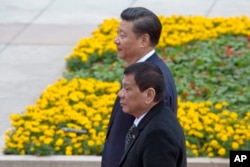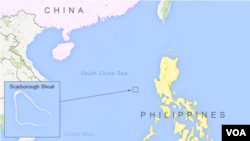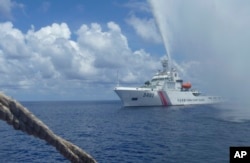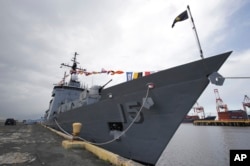China’s reported proposal to build a monitoring station on a tiny shoal disputed by Manila would erode a fragile trust between the two countries and fluster the Philippine president, who is anxious to seek Chinese economic assistance.
Chinese Environmental Monitoring Station
Chinese media reports quoted the mayor of the Chinese city of Sansha as saying last week his government would start preparatory work this year for an environmental monitoring station at Scarborough Shoal, a tiny land feature 230 kilometers from Luzon Island.
The Chinese foreign ministry dismissed those reports Wednesday, saying that "according to the relevant bodies in China, the reports ... are mistaken, these things are not true." Spokeswoman Hua Chunying said at a daily briefing that China places "great importance" on preserving the ecology of the South China Sea but that it also places great importance on its relations with the Philippines.
If China carries through, it would threaten a trust it has established with Philippine President Rodrigo Duterte after a stormy period from 2012 to mid-2016, analysts say. Duterte traveled to Beijing in October and pledged to shelve the maritime dispute and received commitments of $24 billion in aid and investment from China.
“If China were to be very bold about something, barreling up and starting to undertake land reclamation, then I think it would be difficult for Duterte,” said Euan Graham, international security director with the Lowy Institute for International Policy in Sydney. “And public opinion I think would also start to sway in the Philippines.”
Facing Chinese plans
Duterte, whose largely impoverished country is looking for more foreign investment, said Tuesday via the presidential office website he “cannot stop China” at Scarborough Shoal. “We’ll all lose our military and policemen tomorrow, and we are a destroyed nation,” he said, referring to the relatively weak Philippine military.
But later the Philippine Justice Ministry said it would protest to China over its intentions for the shoal, Manila-based news media reported.
The president is conflicted at the moment because he welcomes Chinese help in building an 830-kilometer railway project on Mindanao, said Jay Batongbacal, director of the Institute for Maritime Affairs and Law of the Sea at the University of the Philippines.
Massive aid promised
“China is banking on the fact that it has promised so much international assistance and infrastructure development projects to the Philippines,” Batongbacal said. The prospect of railway aid, he said, “may be factoring into Duterte’s reaction, his fatalistic reaction that ‘oh well, there’s nothing I can do about it.’”
Chinese Vice Premier Wang Yang said on a visit to the Philippines this week his government would be open to helping with the 218 billion peso ($4.34 billion) project, which would connect cities on a vast southern Philippine island that lags other parts of the country in economic development.
History at Scarborough Shoal
Scarborough Shoal was the site of a standoff in 2012 between Chinese and Philippine vessels and it’s part of Beijing’s claim to about 95 percent of the resource-rich South China Sea. Fishing boats from Luzon Island frequent the shoal, which encompasses 158 square kilometers of water.
Duterte said last year he would declare a marine sanctuary in the shoal’s lagoon.
China’s claim to the 3.5 million-square-kilometer sea includes waters that Brunei, Malaysia, Taiwan and Vietnam also call their own. China has irritated the other governments with land reclamation, some for military installations, since it began expanding quickly in 2010.
China would need to reclaim land to build on the shoal, analysts say.
Does monitoring station violate agreement?
Officials in Beijing might argue that a monitoring station doesn’t violate the 2002 Declaration on the Conduct of Parties in the South China Sea that it signed with the Association of Southeast Asian Nations (ASEAN), which is being chaired by the Philippines this year, said Jonathan Spangler, director of the South China Sea Think Tank in Taipei.
That accord only prohibits occupying so far uninhabited land features in the disputed sea,
“Building an environmental monitoring station on Scarborough Shoal could theoretically be done without inhabiting the feature, but that would not make the action seem any less provocative to rival claimants or other major stakeholders,” Spangler said.
The Hainan Daily news report quoting the Chinese mayor has been removed from the Chinese media outlet's website, indicating the official’s statement may have been premature, some experts say. However, China also raised the same prospect last year, prompting the Philippine government then to seek confirmation.
China/Philippines relations at stake
Chinese officials have time to “intervene” now if they hope to sustain strong ties with the Philippines, Batongbacal said.
“There seems to be growing pressure among some critics in the Philippines for Duterte to be more forceful in his response” to China, said Carl Baker, director of programs with the think tank CSIS Pacific Forum in Honolulu.
The Chinese vice premier’s visit, however, suggests that Duterte’s government “continues to believe that it can control the maritime disputes by promising to respond later to China's assertive behavior while taking advantage of the economic benefits of improved relations with Beijing,” Baker said.
A final green light by China or a backlash against Duterte among Filipinos could nudge the country back toward seeking support from its former colonizer and long-time military ally, the United States, some analysts say.
Philippines could turn back toward US
Duterte’s predecessor, Benigno Aquino, leaned heavily the United States for military support, which included joint maritime patrols after 2014. Duterte, a vocal opponent of American influence in the Philippines, canceled those patrols but he has gotten along with U.S. President Donald Trump since Trump took office in January.
U.S. Secretary of State Rex Tillerson said in January before his confirmation that China should be barred from its landfilled islands in the contested sea, a comment that upset Beijing.
Aquino also took the China-Philippine maritime dispute to a world arbitration court. The court ruled in Manila’s favor in July, but China rejected the outcome and has sought bilateral talks with Southeast Asian claimant states to patch over maritime sovereignty issues.








